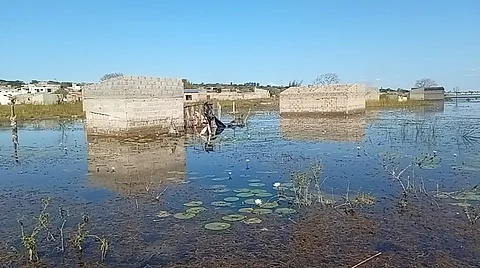

Mozambique is tackling climate change challenges with the LINK Project, a $28 million initiative aimed at strengthening climate resilience and adaptive social protection.
Partnering with Save the Children, the project focuses on empowering vulnerable communities, especially youth, through nature-based solutions, aiming to reduce poverty and enhance food security amidst frequent natural disasters.
Fifty-year old Marta Sigauque stands outside her flooded home and is thinking how to scoop up the water that has flooded her home in the outlying suburb of Ferroviario das Mahotas, a sprawling suburb just outside the Mozambican capital of Maputo.
That is a daunting task made all the more difficult because it is not the first time.
Buckets are all over her home, rooted in the stagnant green water surrounding it.
“I’m struggling to get this water out of my house, but in a few days, it could rain again, and I’ll have to go back to the same situation,” she said pointing to the water that has been stagnant for almost a week.
Her neighbourhood is suffering the impact of two back-to-back flash floods that together drove close to 2,000 families away from their homes in mid-April.
Marta Sigauque’s situation has prompted the Mozambican government to anticipate that climate change will exacerbate the country’s development challenges by 2050, under the worst-case climate projection.
Projections indicate that this will increase Mozambique’s poverty level by five per cent, pushing an additional 1.6 million people into poverty if no significant structural transformation occurs.
In view of this, the government has partnered with Save the Children Mozambique (SCIMOZ) to implement the LINK Project, which seeks to strengthen climate resilience and adaptive social protection in the country.
With a budget of over US$28 million, financed by the United Nations Green Climate Fund (GCF), the LINK Project is one among many other initiatives that will be implemented in nine districts in the provinces of Manica, Tete and Gaza.
Mozambique is one of the poorest countries in the world and ranks third on global weather-related damage, following Bangladesh and Ethiopia. Natural hazards such as droughts, floods, cyclones and related disasters have all been part of Mozambican history and have had an impact in shaping the country’s poverty and vulnerability situation.
A joint media statement by the ministry of Agriculture, Environment and Fisheries (MAAP) and Save the Children Mozambique (SCIMOZ) says the LINK Project is aimed at strengthening climate resilience and adaptive social protection in Mozambique
The five-year initiative will also reduce the adverse impacts of climate change on the most vulnerable communities, in addition to promoting an integrated approach to adaptation and social protection.
MAAP and SCIMOZ say the project prioritises nature-based solutions for economic empowerment of vulnerable groups, especially youth, and emphasises linking with the private sector.
“It offers multiple benefits for rural populations, including improved food and nutrition security, local job creation and the empowerment of women and young people. It is one of 17 projects, in 35 countries, totalling investments of one billion dollars, approved at the 39th meeting of the CGF board, held recently,” the statement says.
According Emília Fumo, MAAP permanent secretary, the Mozambican government’s participation is to implement activities with concrete actions in beekeeping, livestock and agriculture and other activities that will ensure that the impact of climate change is minimised and communities can continue to guarantee their development and well-being.
“The project’s main activities are centred on strengthening institutional and community capacity for climate resilience, implementing locally led adaptation actions and integrating climate change adaptation into district development planning and budgeting,” Fumo told this reporter in an interview in Maputo.
More than 415,000 people will benefit directly from the project and another 933,000 will be reached indirectly, said Carla Landeiro, director of the LINK Project, noting that the actions are to be implemented with the aim of preparing vulnerable communities to face and adapt to climate impacts.
“The essential concept of the project is to “marry” actions to combat climate change in the arid and semi-arid zones of Mozambique and social protection mechanisms”, said Landeiro.
She added: “It’s not about giving the fish, it’s about giving the hook and this will also help to create activities that later generate income to lift out of poverty those who are now in the worst conditions.”
The Save the Children Director in Mozambique, Ilária Manunza highlighted that the LINK Project aims to promote “practical and inclusive solutions, to strengthen the capacity of communities to adapt to droughts and other climate impacts, consequently promoting a more resilient future” for the most vulnerable populations in Mozambique, also protecting natural resources and ensuring the country’s economic and environmental sustainability.
“Together we can strengthen families, protect children, support families and communities in building lasting and sustainable solutions,” said Manunza who considers the climate change situation in Mozambique to be “complex”, as it mainly affects women and children, and therefore states that everyone needs to adjust to better adapt, respond and live with the phenomenon.
The southern African nation is particularly vulnerable to floods, cyclones, and droughts, with cyclones occurring approximately five times yearly.
Northern Mozambique was ravaged by Cyclone Chido in December 2024 and again by Cyclone Dikeledi in January 2025, leaving many people in need of assistance, especially food supplies.
Mozambique is placing special emphasis on the prevention of natural disasters and improving early warning systems. Adaptation measures are being implemented in the agricultural, fisheries, energy, environmental and water sectors, with particular attention being paid to the coastal zones and erosion control.